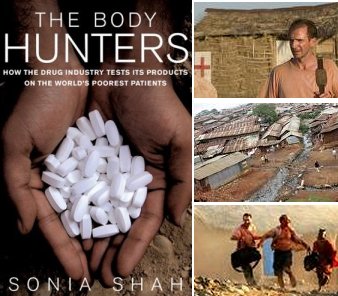The Constant Greedy
The Body Hunters, Sonia Shah 2006
Sonia Shah has written a thorough and disturbing history of the pharmaceutical industry that makes John Le Carre’s The Constant Gardener (Ebook at) look pretty tame. Le Carre wrote the forward to Shah’s book.

Shah’s book focuses on the ethical debate which led to the Nuremberg Code after WWII and to the Declaration of Helsinki in 1975. The pharmaceutical industry including some prominent researchers and supposed regulators continue to insist that testing new drugs against a placebo is the only way to get scientifically valid and meaningful results even though administration of placebos means some subjects get no treatment at all. The Declaration of Helsinki requires that new drugs be tested against the best available treatments.
Pharmaceutical companies need the placebo testing because their new offerings are mostly me-too drugs that are not better than existing approved drugs. Shah documents one case where Eli Lilly wanted to sell Xigris for $7,000 up to $21,000 per treatment of Sepsis, a resistant infestation killing many patients in intensive care. The best available treatment is corticosteroids, old generic drugs costing $50. Eli Lilly knew it couldn’t best the old drug so conducted a group of tests against placebos in developing countries. They then cherry picked the trial with the best results to get approval. One unfortunate trial showed Xigris patients died more often than the placebo patients. These negative results were buried by presenting the results at the conference in Seattle in October 2004 where Viagra was introduced. Eli Lilly was still able to sell $200 million of this wonder drug in 2004. They had been hoping for sales in the billions by aggressive advertising and by intimidating doctors and hospitals. Xigris News

Shah documents a U.S. study where a healthy 19 year old college student was paid $3600 to test a new antidepressant. She was given up to six time the recommended dosage and committed suicide. Her family is suing but is unlikely to prevail.
Shah recommends enforcement of some simple reforms. First, enforce the requirement that new drugs be tested against the best available treatment. Testers currently argue that in developing countries test subjects have no treatment options due to poverty or lack of health care so placebo testing is justified. This simple reform would force pharmaceutical companies to develop drugs that are truly better than existing treatments and should result in treatment breakthroughs.
Second, enforce true informed consent by the test subjects. Informed consent requires the the full extent of the risks including all possible side effects be explained to and understood by test subjects. The consent forms in the developing world are written in English and it is clear the verbal explanations are totally misleading. Even in the developed world, informed consent is not enforced.
Third, require the pharmaceutical companies to make continued treatment available to test subjects after the trial. Today, testers in the developing world simply leave the patients with nothing at the end of their trial, even if the treatments are needed to keep the subjects alive.